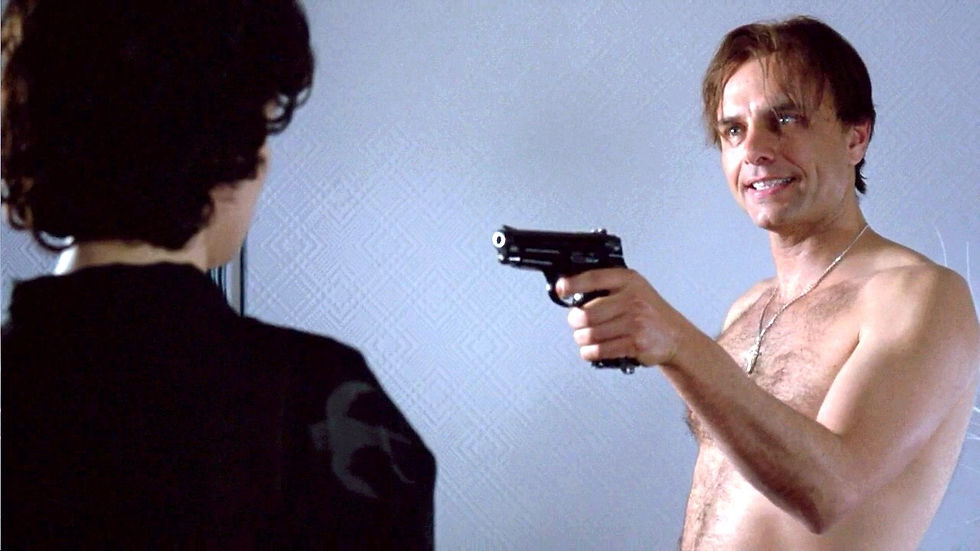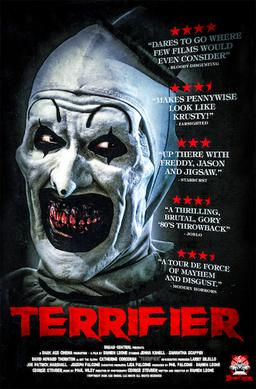Bound (1996) review
- Jeremy Kelly
- Apr 4, 2022
- 5 min read
Bound (1996)
Directed by: The Wachowskis
Produced by: Stuart Boros, Andrew Lazar
Screenplay by: The Wachowskis
Starring: Jennifer Tilly, Gina Gershon, Joe Pantoliano, John Ryan

In 1999, a little movie called “The Matrix” came out; directed by Lana and Lilly Wachowski—then known as Larry and Andy Wachowski—it was lauded beyond comprehension for its groundbreaking special effects and pushing the boundaries of science fiction in cinema . Now don’t go crazy, but…I’m not a fan of it, or its sequels; I respect the fact that it gave action movies a chance to be more philosophical and some of the effects still hold up, but I find the characters really dull and the messaging heavy-handed. I say all this because I want to draw attention to their movie that came out before called “Bound.” It’s a neo-noir thriller about a lesbian couple—Violet (Jennifer Tilly) and Corky (Gina Gershon)—who plot to steal more than $2 million from the mob and escape their difficult lives. Thanks to excellent character interactions and intricate story developments, this is a tour de force of slick craftsmanship and hidden sensibilities.
The film opens with Corky encountering Violet after starting work in her apartment building; Violet is the unwitting wife of mob money launderer Caesar (Joe Pantoliano), who basically whores her out to fellow Mafia members. But when she and Corky meet, there’s immediate chemistry, as the two of them begin a passionate affair. However, circumstances limit their time together; Corky’s an ex-con just out of jail, and Caesar is a hot-headed thug whose violent antics—sometimes in their own home—frequently upset Violet. But they see their opportunity when member Shelly (Barry Kivel) is caught skimming money from the business; a bloody altercation results in Caesar bringing it back to their apartment. Using details from the event, Corky and Violet hatch a scheme to steal the money and frame hated associate Johnnie (Christopher Meloni); but Caesar’s temperament and paranoia causes things to spiral out of control. The tension mounts as the two of them are constantly faced with the choice of either waiting it out together, or fleeing for themselves.
Before she was Chucky’s girlfriend Tiffany and one of the most famous names in the World Series of Poker, Jennifer Tilly was a fresh young talent; with her breathy voice and voluptuous looks, she had excelled playing hilariously ditzy blondes, earning an Oscar nomination for “Bullets Over Broadway.” It really works to her advantage here, as that’s sort of the persona Violet puts on. Around Caesar and his associates, she frequently acts clueless and uncertain, which only masks how driven and manipulative she can be, though still soft-spoken and serene. In contrast, Gina Gershon was coming off a box-office bomb with the cult classic “Showgirls,” which nevertheless made her a more mainstream name. Her Corky is considerably more gritty and prone to wear her emotions on her sleeve—which she rarely even wears, come to think of it. Her body language is terrific; I love the devious sense of excitement on her face when she and Violet start putting together the heist.

So the way Violet and Corky work off each other is a big part of the movie, and yes, it is worth bringing up what a novelty it was at the time to have a homosexual relationship in a mainstream film. If this gets me cancelled in Florida, I don’t care; your governor is a scumbag. It wasn’t as though there was no gay media previously; but for a long time because of the Hays Production Code, it had to be vague or subtly implied. Hollywood began to loosen up by the 1970s and ‘80s, but gay characters were still normally shown as comedic relief or tragic cases; their personalities typically revolved around…well, just being gay. So this was a newer situation in having a lesbian couple’s story in which their orientation didn’t dominate their whole character. Apparently, several studios refused to buy the script unless Corky was changed to a man, which led to the Wachowskis responding, “That movie’s been made a million times, so we’re not interested.” Casting was reportedly difficult, with Gershon’s agents saying she’d be ruining her career. Obviously, LGBTQ representation has become more common among all demographics, so while not necessarily a trail-blazer, this movie is commendable for sticking to its guns and being authentic, hiring feminist writer Susie Bright as a consultant. And…yes, Violet and Corky’s love scenes are unbelievably sexy; they could light up a bonfire with how heated their chemistry is.
Part of the reason is the cinematography; there are plenty of lingering shots on their hands, and one sequence that always stands out is when they’re in separate apartments and each touch the wall, indicating that they’re there for each other in spite of the odds against them. Also, as the title suggests, the vibe gets claustrophobic, showing how they need to trap or hide themselves in order to get by. The movie is full of interactions like that, with characters not letting on how much they know until they can exploit it. The cinematographer is Bill Pope, who’s worked on several Sam Raimi, Edgar Wright and MCU movies; sometimes the lighting is too dark and the fight choreography is slow, but this is another one of those movies that you can watch in black-and-white, and it would still look great and suspenseful. You can tell the Wachowskis were inspired from the likes of Billy Wilder, Alfred Hitchcock and Frank Miller.

So much of the joy is just watching the characters plan and calculate; even if their predictions are way off, there’s such a commitment to what they’re doing. Aside from Tilly and Gershon, we have Joe Pantoliano as a compellingly unhinged Caesar; he gives some terrifically manic reactions, making for an unpredictable antagonist. He’s complemented by the steady presence of John Ryan in his final film role as friend Mickey, and Christopher Meloni in one of his first film roles as Johnnie, who delights in belittling Caesar any chance he gets. However, there is one character that takes you out of the mood just a little, and that’s Johnnie’s father Gino (Richard C. Sarafian), their boss who Violet and Corky trust to provide protection for Johnnie so that Caesar will run. It’s not a bad performance, but the overall tone is so serious, and Gino is almost cartoonishly, laughably, over-the-top Italian; he even says, “I’m Gino Marzzone! Capisce?” I don’t know; this is just a scene I’m never sure how to feel about, and while I love some of the lines in this movie, there are some pretentious bits, although not up to “Matrix” levels.
But taking out aspects you can nitpick, “Bound” is still a personal favorite; apparently, it got some flack when it first came out for the violent content, but it’s a movie about gangsters, double-crossings and forbidden love. It’s going to get dirty at times, and ultimately the movie’s strength is in the characters rather than how bloody or gruesome it gets. I could go even further into how much I love it, but I have a very special review planned for next week, so let’s wrap this up. After serving as writers on the Sylvester Stallone film “Assassins”—in which their initial screenplay was mostly rewritten—the Wachowskis showed that they knew how to make a good movie, and they built that momentum into a financially successful if logistically bloated sci-fi franchise, as well as other big-budget convoluted projects; seven years later, “Jupiter Ascending” is as much of a cult classic as I predicted. Okay, so they’ve done some bizarre work at times but they’ve always had passion, and this is the time where the skill and passion perfectly linked together—dare I say it—hand in hand.
My rating: 10/10





Comments